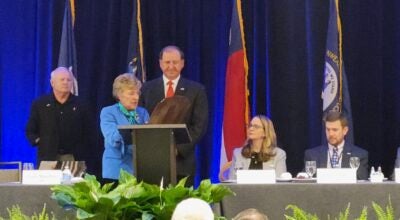Ag Notes: Controlling flies on the farm
Published 8:50 am Tuesday, May 30, 2017
Flies can be a problem on farms during the summertime especially around livestock. Some warm weather and breeding sites is all they need to reproduce in large numbers but there are ways to reduce fly problems.
For fly control on cattle in pastures, ear tags containing insecticides should provide season-long protection as the tags move with the animals from field to field. This is a good alternative if cattle are bring moved often. These work especially well for horn fly control and can reduce irritation from face flies.
If you are using back-rubbers, either oilers or dust bags, for control in more permanent pastures, it is important to check them regularly. The dusts can cake up especially after rains so it is important to make sure dust is loose in the bag and dusting the animals as they move under it. Oilers typically need to be checked as well because they can dry out. Checking them regularly will ensure they are providing a high level of control for your cattle.
Another area where fly control can be a problem is around barns and feedlots. It takes very little dropped feed mixed with some hay or manure to make excellent breeding sites for house and stable flies.
Houseflies are a nuisance and they can also carry a number of diseases of humans and animals as they move from site to site. The stable fly is a little bit larger than a house fly and is a blood feeder. They tend to feed on the lower legs of animals. If you see cattle stomping their feet and you look at their legs you will likely see stable flies feeding. The painful bites they produce reduce the efficiency of your animals.
Fly control really is based on manure management and removal of breeding sites. Warm weather and frequent rains that keep even small amounts of manure and feed wet, it is important to remove these breeding sites as quickly as possible to reduce fly numbers as quickly as possible. Residual fly sprays or fly baits can be used to knock down fly problems but are only a temporary solution.
For more information on controlling flies on the farm, contact the Boyle County Cooperative Extension Service.
Educational programs of the Kentucky Cooperative Extension Service serve all people regardless of economic or social status and will not discriminate on the basis of race, color, ethnic origin, national origin, creed, religion, political belief, sex, sexual orientation, gender identity, gender expression, pregnancy, marital status, genetic information, age, veteran status, or physical or mental disability. University of Kentucky, Kentucky State University, U.S. Department of Agriculture, and Kentucky Counties, Cooperating.
Jerry Little, County Extension Agent for Agriculture/Natural Resources





